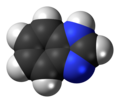Benzimidazole
Benzimidazole is a type of organic compound that consists of a fusion of benzene and imidazole. The structure of benzimidazole is similar to that of purine, a type of nucleobase found in DNA and RNA. Benzimidazole and its derivatives have a wide range of applications in fields such as medicine, agriculture, and industrial chemistry.
Structure and Properties[edit]
Benzimidazole is a bicyclic compound, meaning it consists of two ring structures fused together. The benzene ring is a six-membered ring with alternating single and double bonds, while the imidazole ring is a five-membered ring with two non-adjacent nitrogen atoms. The fusion of these two rings results in a compound with unique chemical properties.
Benzimidazole is a weakly basic compound, with a pKa of approximately 6. Its basicity is due to the presence of the nitrogen atoms in the imidazole ring, which can donate a pair of electrons to form a coordinate covalent bond.
Applications[edit]
Medicine[edit]
In the field of medicine, benzimidazole derivatives are commonly used as antiparasitic agents. Drugs such as albendazole, mebendazole, and triclabendazole are benzimidazoles that are effective against a variety of parasitic worm infections. These drugs work by inhibiting the polymerization of tubulin into microtubules, a critical process for the survival and reproduction of many parasites.
Agriculture[edit]
Benzimidazole derivatives are also used in agriculture as pesticides and fungicides. They work by inhibiting the same tubulin polymerization process as in parasitic worms, but in this case, the target organisms are fungi and pests.
Industrial Chemistry[edit]
In industrial chemistry, benzimidazole and its derivatives are used as corrosion inhibitors, lubricants, and catalysts. They are also used in the synthesis of various other chemical compounds.
See Also[edit]
Benzimidazole gallery[edit]
-
Benzimidazole 2D numbered
-
Benzimidazole 3D balls
-
Benzimidazole 3D spacefill
-
Benomyl
Ad. Transform your life with W8MD's Budget GLP-1 injections from $75


W8MD offers a medical weight loss program to lose weight in Philadelphia. Our physician-supervised medical weight loss provides:
- Weight loss injections in NYC (generic and brand names):
- Zepbound / Mounjaro, Wegovy / Ozempic, Saxenda
- Most insurances accepted or discounted self-pay rates. We will obtain insurance prior authorizations if needed.
- Generic GLP1 weight loss injections from $75 for the starting dose.
- Also offer prescription weight loss medications including Phentermine, Qsymia, Diethylpropion, Contrave etc.
NYC weight loss doctor appointmentsNYC weight loss doctor appointments
Start your NYC weight loss journey today at our NYC medical weight loss and Philadelphia medical weight loss clinics.
- Call 718-946-5500 to lose weight in NYC or for medical weight loss in Philadelphia 215-676-2334.
- Tags:NYC medical weight loss, Philadelphia lose weight Zepbound NYC, Budget GLP1 weight loss injections, Wegovy Philadelphia, Wegovy NYC, Philadelphia medical weight loss, Brookly weight loss and Wegovy NYC
|
WikiMD's Wellness Encyclopedia |
| Let Food Be Thy Medicine Medicine Thy Food - Hippocrates |
Medical Disclaimer: WikiMD is not a substitute for professional medical advice. The information on WikiMD is provided as an information resource only, may be incorrect, outdated or misleading, and is not to be used or relied on for any diagnostic or treatment purposes. Please consult your health care provider before making any healthcare decisions or for guidance about a specific medical condition. WikiMD expressly disclaims responsibility, and shall have no liability, for any damages, loss, injury, or liability whatsoever suffered as a result of your reliance on the information contained in this site. By visiting this site you agree to the foregoing terms and conditions, which may from time to time be changed or supplemented by WikiMD. If you do not agree to the foregoing terms and conditions, you should not enter or use this site. See full disclaimer.
Credits:Most images are courtesy of Wikimedia commons, and templates, categories Wikipedia, licensed under CC BY SA or similar.
Translate this page: - East Asian
中文,
日本,
한국어,
South Asian
हिन्दी,
தமிழ்,
తెలుగు,
Urdu,
ಕನ್ನಡ,
Southeast Asian
Indonesian,
Vietnamese,
Thai,
မြန်မာဘာသာ,
বাংলা
European
español,
Deutsch,
français,
Greek,
português do Brasil,
polski,
română,
русский,
Nederlands,
norsk,
svenska,
suomi,
Italian
Middle Eastern & African
عربى,
Turkish,
Persian,
Hebrew,
Afrikaans,
isiZulu,
Kiswahili,
Other
Bulgarian,
Hungarian,
Czech,
Swedish,
മലയാളം,
मराठी,
ਪੰਜਾਬੀ,
ગુજરાતી,
Portuguese,
Ukrainian




